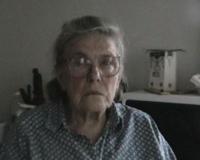At first I didn‘t want to a speak a word of Czech I can speak it very well now, but it is a foreign language for me

Stáhnout obrázek
Hilde Heller was born in 1923 in Nový Oldřichov, near Kamenický Šenov, in a Social Democrat family. As a young girl she started work in a mill in the village of Phillipsdorf, where she was betrothed to a man called Alfred Rief. Unfortunately, he died just before their wedding, on the Eastern Front. She was not expelled after the war, thanks to her newly married husband, a glassblower, as glassblowers were important to the Czech industry. She witnessed the recolonisation of the border region by newcomers, worked in a quarry, her children were automatically given Czech citizenship. Nový Oldřichov, where Hilde Heller still lives, is a Czech speaking town today and she (her husband died in 1993) is the last German speaking inhabitant.
